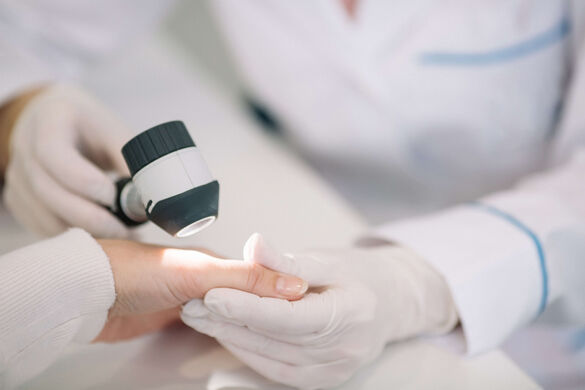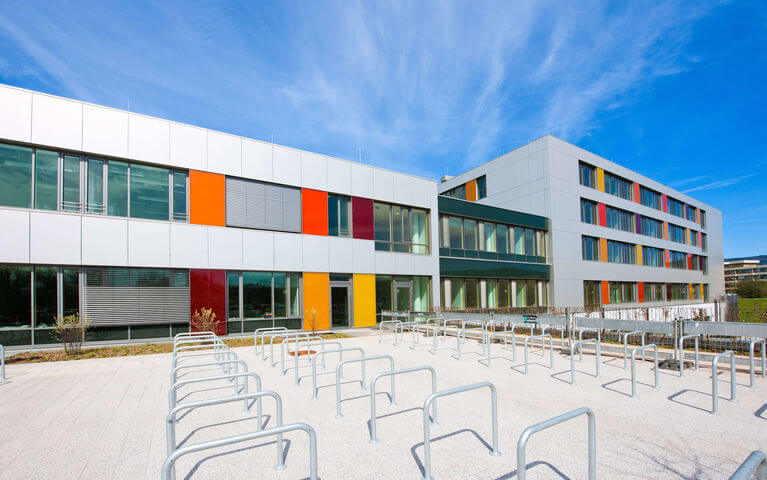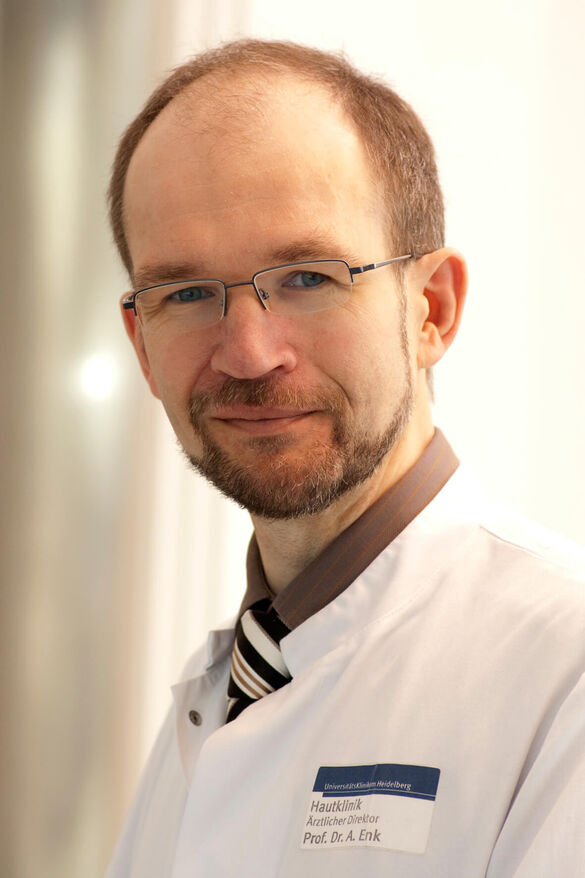Department of Dermatology
brief description
The mission of the department of dermatology is to provide outstanding care to our patients. In our clinic we are seeing 55 000 outpatients per year, treat more than 3 000 inpatients and another 3 000 patients in our modern day-clinic. The department has an outstanding dermatologic reputation covering many areas of dermatology. The main emphasis is on skin cancer, skin surgery, phlebology and chronic wounds. In addition, we have special expertise in the areas of psoriasis, atopic dermatitis, allergies, occupational dermatology, phototherapies and dermatopathology.
As a teaching hospital we are constantly aiming for sustained training of young dermatologists to become experts in clinical dermatology. For doing research our laboratories in union with the Heidelberg biomedical campus provides all up to date opportunities for world-class research, and at the personal level we do our best to create an atmosphere of synergy and creativity to fosters scientific leadership.
Our faculty is committed to the highest level of basic and clinical research in dermatologic science. In particular, we are focused on personalized and translational medicine; bringing scientific results from the bench to the bedside. We have a strong record in federal funding and are recognized as one of the leading dermatologic research units in Germany.
Set of Specification

Core competencies and disease focuses
- Skin cancer center for prevention, early detection and innovative treatments
- Dermatologic surgery center
- Center for immunodermatology and clinical study center for translational research on psoriasis, atopic dermatitis, autoimmune blistering diseases and HIV
- Center for venous disorders including chronic wounds.
- Center for allergy and occupational dermatology, including patient education and disease prevention
- Certified center of dermatohistopathology
- Center for laser medicine and cosmetic dermatology

Key figures that are unique in international comparison
Bringing the outstanding and combined expertise in many areas of clinical dermatology to the patient.
- Endoluminal venous surgery
- High dose IVIg-therapies for autoimmune disease
- Therapeutic repertoire for advanced melanoma and other skin tumors inside of clinical trials
- Therapies for Chronic Pruritus and Chronic Prurigo
WORKING GROUPS WITH INTERNATIONAL EXPERTISE

Unique Features: The department’s areas standing out internationally
Outpatient and inpatient clinic specialized in occupational dermatology. The center is offering individual prevention measures (Tertiary Individual Prevention) in accordance with the standards of the DGUV (German Social Accident Insurance).
Special indicators of interdisciplinary collaboration
- National Center for Tumor Diseases (NCT, Prof. Hassel)
- Interdisciplinary Center for Chronic Inflammatory Diseases (IZEH, Prof. Schäkel).
- Collaborative Research Center (TRR156) funded by the German Research Foundation (DFG)
- Skin Tumor Center: Two outstanding institutions in research and patient care, the German Cancer Research Center (DKFZ) and the Heidelberg University Hospital (UKHD), have joined forces in order to provide best patient care. Cancer patients receive state of the art therapy at the NCT. Physicians and scientists from multiple disciplines work side by side to implement new promising research results as fast as possible. All of them follow the core concept of the NCT: Together against cancer – with focus on the patient.
Research focuses
Occupational Dermatology
The unit of occupational dermatology at the Department of Dermatology is one of the leading centers of occupational dermatology in Germany. Due to the social security system in Germany this field has great significance. Patients are diagnosed and treated for occupational skin disease. One major diagnostic challenge is diagnosing contact dermatitis on occupational substances and allergens. The unit participates in the European surveillance systems on contact allergies (ESSCA) and the German Contact Dermatitis Society (DKG). Research mainly focusses on clinical aspects of contact dermatitis and occupational skin diseases as well as hand eczema, a skin disease that is characterized by a high incidence and prevalence. CARPE, the German registry of chronic hand eczema, was initiated and started in Heidelberg. Recent initiatives address outcome measures for hand eczema in clinical trials and especially measuring quality of life (QOL) in hand eczema patients. The so-called QOLHEQ was developed and validated in Heidelberg, a unique measure for QOL in hand eczema and is currently translated and introduced in other countries and other languages.
Chronic itch
Chronic itch (also called pruritus) is a frequent sensation of the skin that can be caused by dermatoses, but may frequently also be of other origin such as systemic diseases, neurological diseases, psychiatric diseases. In elderly patients it is often seen as so called multifactorial origin pruritus. The Department of Dermatology offers an itch clinic that treats chronic itch patients from an interdisciplinary point of view, also addressing prurigo, a very frequently itchy skin disease. Research in this field covers several areas such as very recent clinical studies offering new substances for prurigo nodularis such as serlopitant, a neurokinin-1 receptor antagonist. Ongoing studies offer nalbuphin, a very new opioid receptor agonist and antagonist for chronic prurigo. Future clinical studies will address biologics such as nemolizumab. Research also addresses clinical aspects of itch such as uremic pruritus focusing on long-term follow up these patients and long-term control of itch. This is the only and greatest cohort study of hemodialysis patients suffering from itch. Other projects address new treatments, documentation of itch e.g. international interdisciplinary validated questionnaires. The European guideline for chronic pruritus is coordinated and led by the University of Heidelberg.
Ongoing studies with international relevance
- Numerous studies on skin cancer, psoriasis, atopic eczema, bullous diseases etc
- Pruritus study: Serlopitant 5 mg in Prurigo nodularis, Folgestudie von Ständer S, Kwon P, Hirman J, Perlman AJ, Weisshaar E, Metz M, Luger TA; TCP-102 Study Group
- Serlopitant reduced pruritus in patients with prurigo nodularis in a phase 2, randomized, placebo-controlled trial. J Am Acad Dermatol. 2019 May;80(5):1395-1402.
- Phase I-IV clinical studies including skin cancer, psoriasis, atopic eczema, prurigo, urticaria, bullous autoimmune diseases, acne inversa
- Skin cancer clinical trials
Publications with international reach
Funck F, Pahl J, Kyjacova L, Freund L, Oehrl S, Gräbe G, Pezer S, Hassel JC, Sleeman J, Cerwenka A, Schäkel K. Human innate immune cell crosstalk induces melanoma cell senescence. Oncoimmunology. 2020 Aug 30;9(1) Freund L, Oehrl S, Gräbe G, Gholam P, Plum T, Schäkel K. Skin-Selective CD8 T-Cell Depletion by Photoimmunotherapy Inhibits Human Cutaneous Acute Graft-Versus-Host Disease. J Invest Dermatol. 2020 Jul;140(7):1455-1459. Menzer C, Menzies AM, Carlino MS, Reijers I, Groen EJ, Eigentler T, de Groot JWB, van der Veldt AAM, Johnson DB, Meiss F, Schlaak M, Schilling B, Westgeest HM, Gutzmer R, Pföhler C, Meier F, Zimmer L, Suijkerbuijk KPM, Haalck T, Thoms KM, Herbschleb K, Leichsenring J, Menzer A, Kopp-Schneider A, Long GV, Kefford R, Enk A, Blank CU, Hassel JC. Targeted Therapy in Advanced Melanoma With Rare BRAF Mutations. J Clin Oncol. 2019 Nov 20;37(33):3142-3151. Hassel JC. 5-year results for pembrolizumab treatment of advanced melanoma. Lancet Oncol. 2019 Sep;20(9):1187-1189. Ahmad F, Döbel T, Schmitz M, Schäkel K. Current Concepts on 6-sulfo LacNAc Expressing Monocytes (slanMo). Front Immunol. 2019 May 22;10:948. Olaru F, Döbel T, Lonsdorf AS, Oehrl S, Maas M, Enk AH, Schmitz M, Gröne EF, Gröne HJ, Schäkel K. Intracapillary immune complexes recruit and activate slan-expressing CD16+ monocytes in human lupus nephritis. JCI Insight. 2018 Jun 7;3(11) Altimetrics TOP 100 Manuscript (2018): Haenssle HA, Fink C, Schneiderbauer R, Toberer F, Buhl T, Blum A, Kalloo A, Ben Hadj Hassen A, Thomas L, Enk A, Uhlmann L: Man against machine: diagnostic performance of a deep learning convolutional neural network for dermoscopic melanoma recognition in comparison to 58 dermatologists. Annals of Oncology 2018; 29(8):1836-1842 Hassel JC, Heinzerling L, Aberle J, Bähr O, Eigentler TK, Grimm MO, Grünwald V, Leipe J, Reinmuth N, Tietze JK, Trojan J, Zimmer L, Gutzmer R. Combined immune checkpoint blockade (anti-PD-1/anti-CTLA-4): Evaluation and management of adverse drug reactions. Cancer Treat Rev. 2017 Jun;57:36-49. Hassel JC. Ipilimumab plus nivolumab for advanced melanoma. Lancet Oncol. 2016 Nov;17(11):1471-1472. Bender C, Dimitrakopoulou-Strauss A, Enk A, Hassel JC. Safety of the PD-1 antibody pembrolizumab in patients with high-grade adverse events under ipilimumab treatment. Ann Oncol. 2016 Jul;27(7):1353-4 Co: Müller A, Dickmanns A, Resch C, Schäkel K, Hailfinger S, Dobbelstein M, Schulze-Osthoff K, Kramer D. The CDK4/6-EZH2 pathway is a potential therapeutic target for psoriasis. J Clin Invest. 2020 Nov 2;130(11):5765-5781. Herster F, Bittner Z, Archer NK, Dickhöfer S, Eisel D, Eigenbrod T, Knorpp T, Schneiderhan-Marra N, Löffler MW, Kalbacher H, Vierbuchen T, Heine H, Miller LS, Hartl D, Freund L, Schäkel K, Heister M, Ghoreschi K, Weber ANR. Neutrophil extracellular trap-associated RNA and LL37 enable self-amplifying inflammation in psoriasis. Nat Commun. 2020 Jan 8;11(1):105. doi: 10.1038/s41467-019-13756-4. Ascierto PA, Long GV, Robert C, Brady B, Dutriaux C, Di Giacomo AM, Mortier L, Hassel JC, Rutkowski P, McNeil C, Kalinka-Warzocha E, Savage KJ, Hernberg MM, Lebbé C, Charles J, Mihalcioiu C, Chiarion-Sileni V, Mauch C, Cognetti F, Ny L, Arance A, Svane IM, Schadendorf D, Gogas H, Saci A, Jiang J, Rizzo J, Atkinson V. Survival Outcomes in Patients With Previously Untreated BRAF Wild-Type Advanced Melanoma Treated With Nivolumab Therapy: Three-Year Follow-up of a Randomized Phase 3 Trial. JAMA Oncol. 2019 Feb 1;5(2):187-194 Wang DY, Salem JE, Cohen JV, Chandra S, Menzer C, Ye F, Zhao S, Das S, Beckermann KE, Ha L, Rathmell WK, Ancell KK, Balko JM, Bowman C, Davis EJ, Chism DD, Horn L, Long GV, Carlino MS, Lebrun-Vignes B, Eroglu Z, Hassel JC, Menzies AM, Sosman JA, Sullivan RJ, Moslehi JJ, Johnson DB. Fatal Toxic Effects Associated With Immune Checkpoint Inhibitors: A Systematic Review and Meta-analysis. JAMA Oncol. 2018 Dec 1;4(12):1721-1728. Larkin J, Minor D, D'Angelo S, Neyns B, Smylie M, Miller WH Jr, Gutzmer R, Linette G, Chmielowski B, Lao CD, Lorigan P, Grossmann K, Hassel JC, Sznol M, Daud A, Sosman J, Khushalani N, Schadendorf D, Hoeller C, Walker D, Kong G, Horak C, Weber J. Overall Survival in Patients With Advanced Melanoma Who Received Nivolumab Versus Investigator's Choice Chemotherapy in CheckMate 037: A Randomized, Controlled, Open-Label Phase III Trial. J Clin Oncol. 2018 Feb 1;36(4):383-390. D'Angelo SP, Larkin J, Sosman JA, Lebbé C, Brady B, Neyns B, Schmidt H, Hassel JC, Hodi FS, Lorigan P, Savage KJ, Miller WH Jr, Mohr P, Marquez-Rodas I, Charles J, Kaatz M, Sznol M, Weber JS, Shoushtari AN, Ruisi M, Jiang J, Wolchok JD. Efficacy and Safety of Nivolumab Alone or in Combination With Ipilimumab in Patients With Mucosal Melanoma: A Pooled Analysis. J Clin Oncol. 2017 Jan 10;35(2):226-235 Eggermont AM, Chiarion-Sileni V, Grob JJ, Dummer R, Wolchok JD, Schmidt H, Hamid O, Robert C, Ascierto PA, Richards JM, Lebbé C, Ferraresi V, Smylie M, Weber JS, Maio M, Bastholt L, Mortier L, Thomas L, Tahir S, Hauschild A, Hassel JC, Hodi FS, Taitt C, de Pril V, de Schaetzen G, Suciu S, Testori A. Prolonged Survival in Stage III Melanoma with Ipilimumab Adjuvant Therapy. N Engl J Med. 2016 Nov 10;375(19):1845-1855. Menzies AM, Johnson DB, Ramanujam S, Atkinson VG, Wong ANM, Park JJ, McQuade JL, Shoushtari AN, Tsai KK, Eroglu Z, Klein O, Hassel JC, Sosman JA, Guminski A, Sullivan RJ, Ribas A, Carlino MS, Davies MA, Sandhu SK, Long GV. Anti-PD-1 therapy in patients with advanced melanoma and preexisting autoimmune disorders or major toxicity with ipilimumab. Ann Oncol. 2017 Feb 1;28(2):368-376. Sznol M, Ferrucci PF, Hogg D, Atkins MB, Wolter P, Guidoboni M, Lebbé C, Kirkwood JM, Schachter J, Daniels GA, Hassel J, Cebon J, Gerritsen W, Atkinson V, Thomas L, McCaffrey J, Power D, Walker D, Bhore R, Jiang J, Hodi FS, Wolchok JD. Pooled Analysis Safety Profile of Nivolumab and Ipilimumab Combination Therapy in Patients With Advanced Melanoma. J Clin Oncol. 2017 Dec 1;35(34):3815-3822. Long GV, Atkinson V, Ascierto PA, Robert C, Hassel JC, Rutkowski P, Savage KJ, Taylor F, Coon C, Gilloteau I, Dastani HB, Waxman IM, Abernethy AP. Effect of nivolumab on health-related quality of life in patients with treatment-naïve advanced melanoma: results from the phase III CheckMate 066 study. Ann Oncol. 2016 Oct;27(10):1940-6. Kranz LM, Diken M, Haas H, Kreiter S, Loquai C, Reuter KC, Meng M, Fritz D, Vascotto F, Hefesha H, Grunwitz C, Vormehr M, Hüsemann Y, Selmi A, Kuhn AN, Buck J, Derhovanessian E, Rae R, Attig S, Diekmann J, Jabulowsky RA, Heesch S, Hassel J, Langguth P, Grabbe S, Huber C, Türeci Ö, Sahin U. Systemic RNA delivery to dendritic cells exploits antiviral defence for cancer immunotherapy. Nature. 2016 Jun 16;534(7607):396-401. Johnson DB, Sullivan RJ, Ott PA, Carlino MS, Khushalani NI, Ye F, Guminski A, Puzanov I, Lawrence DP, Buchbinder EI, Mudigonda T, Spencer K, Bender C, Lee J, Kaufman HL, Menzies AM, Hassel JC, Mehnert JM, Sosman JA, Long GV, Clark JI. Ipilimumab Therapy in Patients With Advanced Melanoma and Preexisting Autoimmune Disorders. JAMA Oncol. 2016 Feb;2(2):234-40. Van Allen EM, Miao D, Schilling B, Shukla SA, Blank C, Zimmer L, Sucker A, Hillen U, Foppen MHG, Goldinger SM, Utikal J, Hassel JC, Weide B, Kaehler KC, Loquai C, Mohr P, Gutzmer R, Dummer R, Gabriel S, Wu CJ, Schadendorf D, Garraway LA. Genomic correlates of response to CTLA-4 blockade in metastatic melanoma. Science. 2015 Oct 9;350(6257):207-211. Weber JS, D'Angelo SP, Minor D, Hodi FS, Gutzmer R, Neyns B, Hoeller C, Khushalani NI, Miller WH Jr, Lao CD, Linette GP, Thomas L, Lorigan P, Grossmann KF, Hassel JC, Maio M, Sznol M, Ascierto PA, Mohr P, Chmielowski B, Bryce A, Svane IM, Grob JJ, Krackhardt AM, Horak C, Lambert A, Yang AS, Larkin J. Nivolumab versus chemotherapy in patients with advanced melanoma who progressed after anti-CTLA-4 treatment (CheckMate 037): a randomised, controlled, open-label, phase 3 trial. Lancet Oncol. 2015 Apr;16(4):375-84. |






